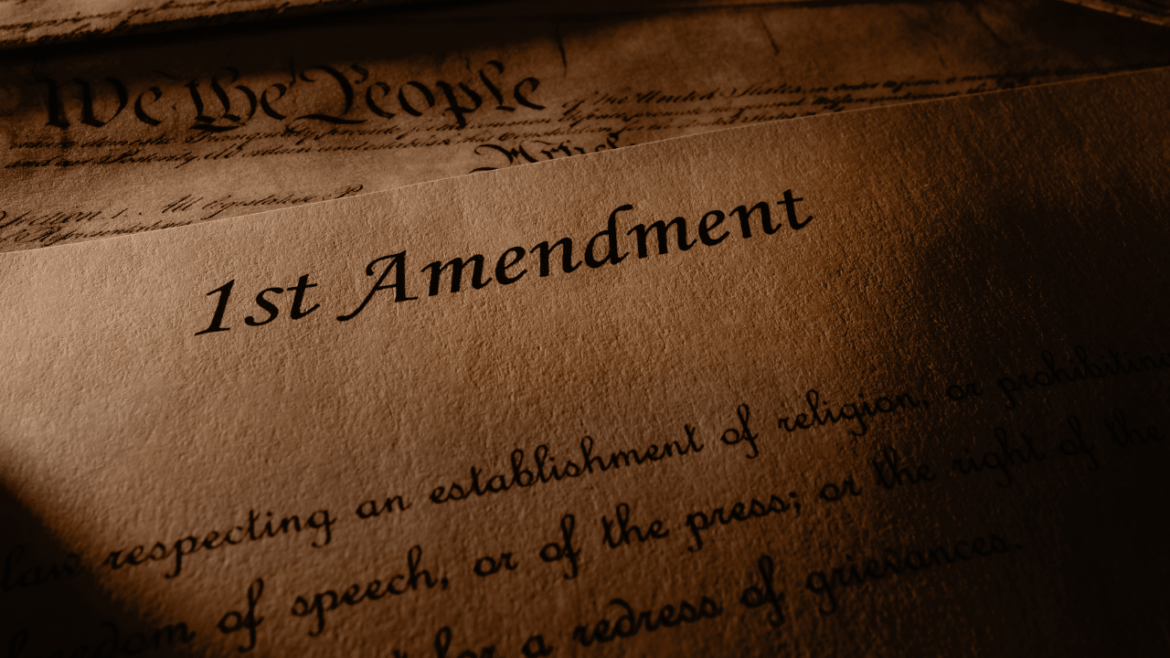“Congress shall make no law … abridging the freedom of speech.”
— First Amendment to the U.S. Constitution
Here is a pop quiz: If the states ratified an amendment to the Constitution repealing the First Amendment, would we still enjoy the freedom of speech? That depends on which value prevails: Are our rights only what lawmakers have written down, or are they personal attributes immune from governmental reach?
When James Madison was crafting the First Amendment, he insisted that the word “the” precede “freedom of speech” in order to manifest the Framers’ belief that the freedom of speech preexisted the government. The First Amendment is a negative right. It doesn’t grant the freedom of speech. It negates Congress from abridging it.
What is a right, and where does it come from? A right is an indefeasible personal claim against the whole world. It does not require a government permission slip or any precondition or community consensus — only the ability to reason. It belongs to every human by virtue of our existence.
Privileges — like voting in a government election or driving an automobile on a government roadway — come from the government. Rights come from our humanity.
If you accept the existence of the natural law — a body of unchanging moral principles universally knowable by the exercise of reason — you accept that natural rights are ours to exercise whether the government is expressly prohibited from interfering with them or not.
Thus, under the natural law, murder would still be wrong and unlawful, even if the government were to permit itself and others to kill, as, of course, governments do.
Under the natural law, the answer to our pop quiz is that because the freedom of speech is a natural human right, it exists and is immune from governmental interference whether the prohibition on interference is written down or not.
Is natural law in the Constitution? Yes. The Ninth Amendment — Madison’s crown jewel — recognizes the existence of personal human rights too numerous to articulate, and it prohibits the government from denying or disparaging them.
The opposite of natural law is positivism. It teaches that law is only that which has been written down and ratified by the law giver. Under positivism, there is no natural law restraint upon the government; right and wrong are only and always whatever the government says they are. Under positivism, the answer to our pop quiz is that the freedom of speech would be fair game for the government to abridge.
The freedom of speech — to think as you wish, to say what you think, to offer what you say — is so normal, so human, so integral to the very existence of each of us, who cares what the government thinks of it?
Yet, today, the government thinks very little of the freedom of speech, even though all in government — from the president on down to a part-time government janitor — have sworn allegiance to the Constitution. Today, even though the First Amendment only verbally addresses Congress, the freedom of speech is protected from all government infringement — whether local, state or federal; whether legislative, executive or judicial.
I offer this brief philosophical and historical discourse on the freedom of speech as background in order to address how this basic freedom is under attack today.
A series of recent events, from and after the wars in Ukraine and Gaza, have manifested government’s — and often the public’s — antipathy to free speech. Last month, in Illinois, a newspaper reporter was criminally charged with interfering with a government function because he asked a city official at a public meeting too many questions for the official’s comfort level. Last week, in Alabama, a publisher and reporter were arrested for disclosing grand jury evidence, which they lawfully possessed.
Recently in Philadelphia, a former New Jersey State Senator was kicked out of a stadium owned by the government for displaying and refusing to remove American and Israeli flags at an Eagles game. And all over American college campuses today, each side in the Israeli/Hamas PR war wants the government to silence the other side because — each claims — the speech is dangerous or untruthful.
What ever happened to the freedom of speech?
Each of these events warrants its own factual and legal analysis. But at the core of all is the dangerous view that government can interfere with speech it hates or fears. That is the opposite of the values underlying free speech. Those values — articulated in a unanimous Supreme Court decision in 1969 called Brandenburg v. Ohio — are that all innocuous speech, even speech encouraging violence or hatred, is absolutely protected. And all speech is innocuous when there is time for more speech to challenge it.
This analysis is not about speech in your living room. It is about public speech in public places. That is the speech — no matter how caustic or distasteful or provocative — that the First Amendment was written to protect. Even erroneous speech — like 2 plus 2 equals 22 — is protected. We all have the natural right to pursue happiness. And no one can be truly happy if afraid to speak his or her mind.
The government can never morally or legally interfere with speech because of its content. The government doesn’t enjoy the freedom of speech; only individuals do. The whole purpose of the First Amendment is to keep the government out of the business of speech so that individuals can decide for themselves what to say and hear.
“If all mankind minus one,” John Stuart Mill famously wrote, “were of one opinion, and only one person were of the contrary opinion, mankind would be no more justified in silencing that one person, than he, if he had the power, would be justified in silencing mankind.”
American culture once embraced this.
To learn more about Judge Andrew Napolitano, visit https://JudgeNap.com.
COPYRIGHT 2023 ANDREW P. NAPOLITANO
DISTRIBUTED BY CREATORS.COM

